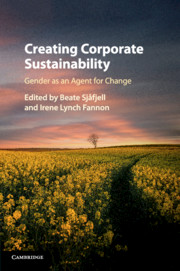Book contents
- Creating Corporate Sustainability
- Creating Corporate Sustainability
- Copyright page
- Dedication
- Contents
- Contributors
- Foreword
- Preface
- 1 Corporations, Sustainability and Women
- Part I Women as Influencers of Corporate Action
- 2 Reclaiming Value and Betterment for Bangladeshi Women Workers in Global Garment Chains
- 3 Access to Voice
- 4 Ascertaining Corporate Sustainability from ‘Below’
- Part II Current Strategies for Corporate Sustainability
- Part III Feminist Theories and Corporate Sustainability
- Index
4 - Ascertaining Corporate Sustainability from ‘Below’
The Case of the Ghanaian Rural Mining Communities
from Part I - Women as Influencers of Corporate Action
Published online by Cambridge University Press: 14 May 2018
- Creating Corporate Sustainability
- Creating Corporate Sustainability
- Copyright page
- Dedication
- Contents
- Contributors
- Foreword
- Preface
- 1 Corporations, Sustainability and Women
- Part I Women as Influencers of Corporate Action
- 2 Reclaiming Value and Betterment for Bangladeshi Women Workers in Global Garment Chains
- 3 Access to Voice
- 4 Ascertaining Corporate Sustainability from ‘Below’
- Part II Current Strategies for Corporate Sustainability
- Part III Feminist Theories and Corporate Sustainability
- Index
Summary
- Type
- Chapter
- Information
- Creating Corporate SustainabilityGender as an Agent for Change, pp. 67 - 88Publisher: Cambridge University PressPrint publication year: 2018



